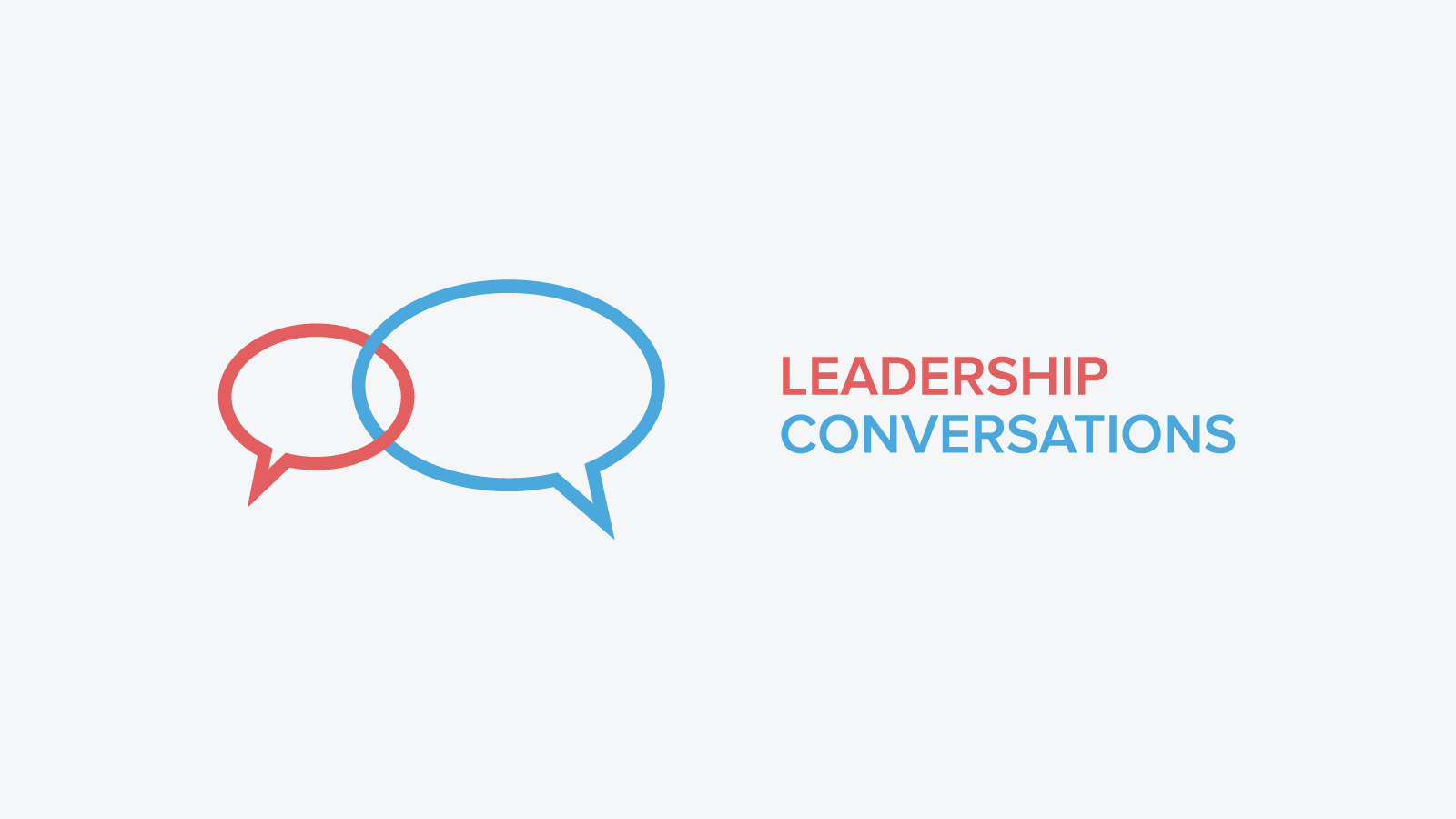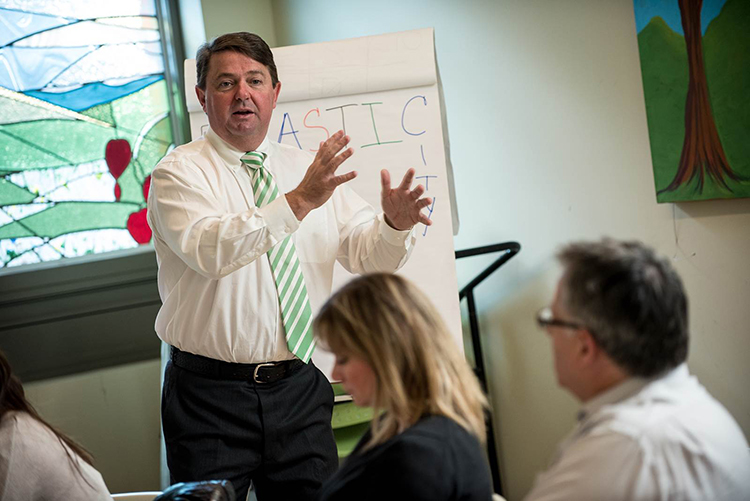
10 min read
John Leeburn transformed from meat-packing-plant HR person to accomplished city leader. He shares how he communicates strategy to his diverse employee base.
By Brad Palmer

Cities are big, complicated organizations. A huge diversity of employees, spread across many locations and functions. In this interview we learn what inspired John Leeburn, the CAO of the city of Port Coquitlam, to take on this challenge. And the leadership techniques he uses to connect with his expansive team.
Brad: Hi John. I’m curious how leading cities became your chosen career.
John: One of the things I came to know about myself early on was that I didn't want to do what my dad did. My dad was a tradesman. He worked in the shipyards in Belfast, Northern Ireland, and then we immigrated when I was thirteen. He was basically a welder and fabricator by trade. I knew I didn't want to do that mainly because as I puttered about and tried to be a handy person, I quickly learned I had none of those skills. I knew I wasn't going to survive with my hands. I knew that I was going to end up with some sort of education, so I did a commerce degree. I grew up in British Columbia in the late mid 70s and 80s. There was a very strong labor movement here. I did my undergrad with a major in industrial relations.
Brad: Interesting.
John: Yeah. It was a significantly higher private sector level of unionization and it seemed like a really interesting field. I got my first job in Winnipeg, Manitoba. Canada Packers in a slaughterhouse. I worked both beef and hog house and the poultry slaughterhouse. Really, Brad, just a really fascinating transition. I moved to Winnipeg in 1986, which was the expo year here in Vancouver. Left here in September of '86, full of West Coast pride and everything that was going on here and ended up in literally a slaughterhouse in Winnipeg. Very quickly had my highfalutin ideas brought right down to earth with the reality of what happens in a slaughterhouse and the people who work in a slaughterhouse. I got grounded real quick.
Brad: Yeah, no kidding.
John: I got amazing experience real quick. My plan in going to Packers, I thought it would take me a number of years to build my resume and then hopefully come back to the West Coast. It happened much more quickly than that. I came back about, I don't know maybe fourteen or fifteen months later to come back here for a wedding. Then on the flight back to Winnipeg I just picked up a newspaper to read on the plane and there was an ad in the newspaper for a job in the city of New Westminster of an HR advisor, personnel officer it was called in those days. I thought "Well, what have I got to lose?" Right? I'd just been back for a wedding, missed family, missed the West Coast and thought, "Nothing ventured, nothing gained." Threw my hat in the proverbial ring and push came to shove and I was back much quicker than I thought I was.
It's not as if I chose working for cities as a conscious decision. It was what brought me back to the West Coast from Winnipeg. Then it was sort of going through New Westminster from the HR advisor job to the deputy department head job, and then moving to Maple Ridge as the HR department head. Then through the ranks in Maple Ridge going from just the HR portfolio, to the whole corporate services portfolio, to a job that wasn't called deputy manager but was similar to … It was on the corporate management team level. I was there for seventeen years and then finally the opportunity came up in Port Coquitlam. Port Coquitlam is the town I live in. When this opportunity came up, I just jumped on this one, because this is, for me, the perfect combination of living and serving in my town. That's kind of the past.
Brad: Port Coquitlam's a nice place. I actually worked there for five years; just prior to starting Jostle.
John: Interesting. I've been here since 1988 and it feels very much like home.
Brad: What's the leadership lesson you learned at Canada Packers? That's intriguing.
John: I don't know if it's a leadership lesson, it was a real life lesson Brad. What I learned there was tremendous respect for hardworking folks. It's a slaughterhouse. The place I started at was on the rail line and the livestock got off the trains and were marched up a ramp to the sixth floor, the kill floor.
Everywhere in the plant you saw how hard people worked. They were making decent money, but you really appreciated that this was hard graft every day, and to respect that. Let me tell you, the life lesson was this one.
About, I don't know, maybe ten months after I got there, Canada Packers announced they were closing down the beef slaughterhouse and they moved me onto the chicken factory. One of the things I had to do before leaving there was help folks with their transition with whatever the company could do in combination with unemployment insurance. To get them services to help them find other jobs, right?
Brad: Wow.
John: You had people in there with grade ten, grade eleven, grade nine educations, who all their lives had either been a meat cutter or some form of laborer, and had built up a lifestyle around making whatever they were making at the time, twenty, twenty-one dollars an hour. Industry in Winnipeg wasn't doing well at that time, so the opportunity for them to go and work for competitors was almost nothing. You really saw the stress of someone who had had their ability to support their family taken away from them. With a skill set that was incredibly narrow and the opportunities to apply that skill set anywhere else really narrow. You had meat cutters being trained to do other things that weren't going to pay union wages anywhere near what they were being paid at Packers. It reinforces that I'm glad I got the education and I'm glad my skill set's a bit more versatile. You really feel for those folks.
Brad: It really weighs on the overall responsibility of a leader to keep a business viable.
John: Yep, exactly.
Brad: As a leader, people depend on you in so many ways.
John: They most certainly do. Helping those employees was a very hard thing to do. Helping wasn’t hard. Watching what they went through was hard. It wasn’t their fault the plant was closing.
Brad: Leading cities has always intrigued me. There's such a diversity of employees, all sorts of education levels, all sorts of generations, all sorts of job responsibilities, all sorts of work environments. Leading a city seems like a really hard job.
John: It's hard. I think about some of the jobs our people do, Brad, and I think they've got way harder jobs than I do. Your observation about diversity, both across the lines of business and across age groups is absolutely true. I just finished doing a tour of the city, twenty small group sessions just right after Christmas, just talking about where the organization's going and doing it in groups of fifteen or twenty employees, and then going all around the city.
The diversity of employees really smacks home when at 3:30 in the afternoon you're down at the works yard talking to the guys that put pipe together, and fix roads, and pick up garbage and then at 7:00 at night I'm talking to a bunch of lifeguards. It's a very different work group, you know?
Brad: Yeah.
John: Then at 8:00 the next morning you're in an office group and then end of the day you're out at the fire department. It's very diverse, it's diverse in age, it's diverse in lines of business. It ain't building widgets, that's for sure.
Brad: Visiting teams as small groups seems like a very interesting way to really, truly engage with people, and I guess you hear some interesting feedback when you do that?
John: It's the best way. It's time consuming, but seeing people face to face… We're trying to make some change in Port Coquitlam. Change is very difficult, but change is really difficult if people don't know who you are and start to trust you. There are different ways people can get to know you and trust you but, in my mind, one of the better ways is to get out in front of them and getting out in front of them in small groups. The tour I just finished it was pretty neat.
You're right, you get feedback. Usually you don't get it directly, but you will certainly get it the next day from some of the conversation that went on, or people will ask questions and from the questions you get you can infer some feedback. By the tone of the room, how your message is being received, that's also feedback. It was a really neat experience.
Brad: I actually did the same thing at the company I managed in Port Coquitlam and there we had to execute a pretty significant cultural turnaround. I learned two important things then. One is that you have to do it regularly -- people don't trust you the first tour through.
John: Hundred percent.
Brad: And the other one is, when you do get suggestions or requests from people, you have to make sure you overtly act on them, one way or another.
John: Yep, close the loop.
Brad: Exactly.
John: If you can't do what they suggested, you do absolutely need to go back when you've thought about it, ”I appreciate the input and we're going to do this but we can't do that for these reasons.” They feel that they were heard and that you took them seriously.
Brad: This is a technique you've used for a while, it sounds like.
John: Yeah, we've done it in different ways. I've been here for two and a half years. When I first got here I went group to group, in the same format. In the interim times I've had update meetings, but in a larger group where you might do two or three at City Hall, and then a couple down at works yard, and try and grab fire at shift change. Usually those, Brad, have been updates on particular projects that are going on, whether it's capital projects, or something about budget, or we did a large employee survey shortly after I got here. We were updating on what's going on with the survey, and what those results are, and what it means for folks, and what we're going to do about it.
When I first got here, first we did the small groups, then a series of larger groups on topic-related stuff and then, and just recently back out on tour for a kind of "Here's where the organization is going, let me share my vision with you. Here's what I want the organization to look like," kind of a tour.
Then we have a couple other neat things starting as well, all with the goal of keeping communication going. Probably the one that's most relevant is we're doing these monthly video blog updates where I go down to the works yard, and we tape it at the works yard. Basically it's somewhere just short of ten minutes on what's going on, what's happened in the last month, and we live-stream it across the organization.
The people at the works yard don't access computers a lot, so that's why we do it live down there, but the people in the rest of the organization who are more likely to have access to computers can watch it live. We do it at a quarter to four for the last ten minutes of the day.
Brad: Smart.
John: Yeah, it works well. You've got to get in front of the works yard guys. They want to see the whites of your eyes. They're not going to sign on a computer and look at you. It’s true.
Brad: Thanks John. All-in-all a smart and comprehensive approach to employee communications.
Our day job at Jostle is creating a platform that helps leaders engage employees, drive culture and catalyze collaboration. Through this Leadership Conversations series we seek out top people-oriented leaders to explore these topics with us. If you know someone we should include in this series, please contact us at leaders@jostle.me
 John Leeburn
John Leeburn
John Leeburn is the Chief Administrative Officer for Port Coquitlam. In his twenty-five years working in municipal government in Metro Vancouver, John has held steadily more senior positions, and has proven his ability to lead municipal departments, work closely with Council and other department heads, build trusting relationships, and engage workforces.
John is one of the few CAO’s in the province of British Columbia, Canada to start his career in human resources. When not at work he can be found wandering around Port Coquitlam with his golden retriever, Echo.
Read more by
Brad Palmer
Jostle’s employee success platform is where everyone connects, communicates, and celebrates at work. Find out more at jostle.me. © 2009–2024 Jostle Corporation. All rights reserved.